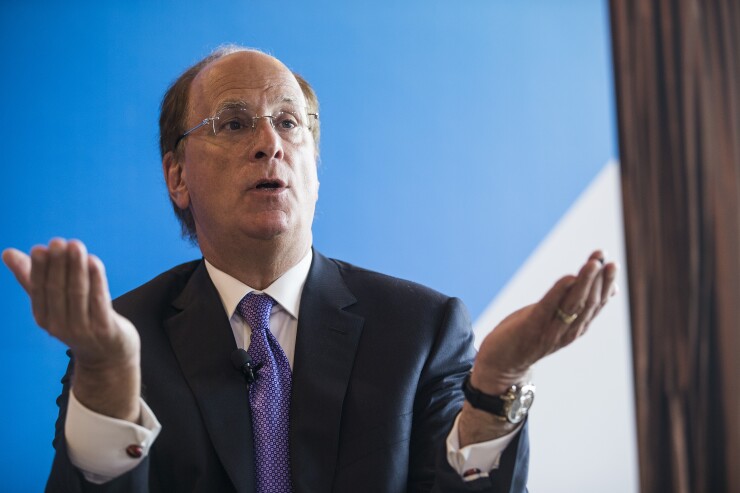DALLAS -- Private investments rather than municipal bonds must bear much of the financial burden for rebuilding the crumbling national infrastructure, according to at least one of the business executives meeting with cabinet secretaries and President Trump at the White House to discuss infrastructure and tax policy.

Larry Fink, CEO of the global investment firm BlackRock, told shareholders in a letter dated Monday that private investments are necessary because neither federal or state and local resources can meet the country’s infrastructure investment needs. State and local governments will be hard-pressed to issue debt because of mounting pension liabilities, he said.
“These projects must deliver competitive returns and that will often require efficiencies that can only be achieved through private ownership,” Fink said in the letter. “Policymakers, workers, and unions must work together to find a model that will allow private enterprise to generate the long-term returns necessary to attract capital and build a more prosperous future.”
Fink was part of the White House discussion group on Tuesday that included Mick Mulvaney, director of the Office of Management and Budget, former Boeing CEO Jim McNerney, and Kevin Warsh of the Hoover Institute.
Private capital is desperately needed to make up the difference between the money available through public finance and the cost of infrastructure, Fink said.
“A new form of federally subsidized bonds could help finance the deferred maintenance required simply to maintain the status quo,” he said. “But fixing crumbling roads and bridges is not enough. We need to be focused on reshaping our world, not just repairing it.”
The national infrastructure gap exists in part because of the strong municipal finance market that has developed in the U.S., Fink said.
“As a result of the success of that model, the U.S. never developed a healthy market for private infrastructure investment,” he said. “Today, however, state and local governments are incapable of meeting the massive need for infrastructure reinvestment, in large part because of the retirement crisis they are grappling with.”
The median state pension fund is less than 75% funded, Fink said.
“Making up these shortfalls will leave few resources at the state and local level for infrastructure,” he told BlackRock shareholders. “Budget pressures at the federal level also leave little room for Washington to fill the gap.”
Chao said last week that an infrastructure bill could be introduced in Congress as early as May. That is unlikely to happen without tax reform to provide the $200 billion to $300 billion of promised additional federal infrastructure funding, said Jeff Davis, a senior fellow at the Eno Center for Transportation.
“The ‘pay-for’ for any Trump infrastructure plan is likely to involve the tax code, whether it's the $140 billion in special tax credit bonds in the $1 trillion plan the campaign outlined or some variant of repatriation of overseas corporate income,” Davis said.
The pay-fors do not have to be included in the tax reform bill but must be accounted for in the tax measure, he said.
“No reform of the overseas corporate income tax can proceed until we know how repatriation is going to be handled,” Davis said. “Any bonds as big as the one the Trump campaign was talking about would also make tax reform more difficult unless they are dealt with at the same time.”
Tax reformers are reluctant to link their issue to infrastructure spending, said Robert Freeman, a government relations principal at Cozen O'Connor Public Strategies.
“The people at the [House] Ways and Means Committee want to do tax reform but they don’t want those dollars linked to infrastructure,” he said. “If there are two separate pieces of legislation, then it might be feasible.”
Municipal bonds will remain crucial to infrastructure funding even with the emphasis on private investments in the Trump plan, said Barry Gold, director of infrastructure at Orix USA.
“Muni bonds are a very attractive source of capital and will remain an important aspect of financing infrastructure,” Gold said. “The idea is to maximize the most effective financing available. Taxable capital, and then public sector programs such as TIFIA loans and TIGER grants should be directed to those areas that municipal bonds cannot cover.”





